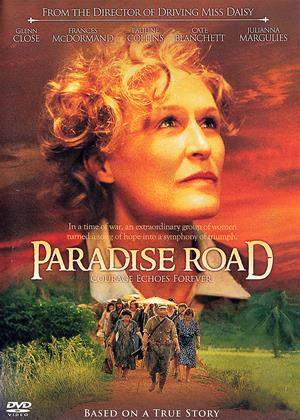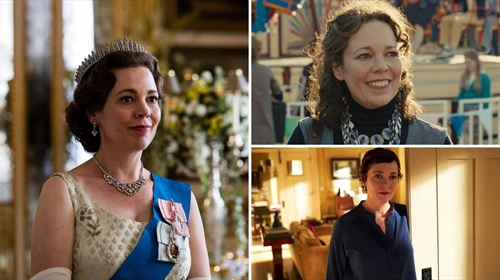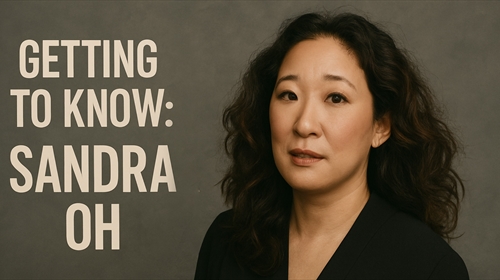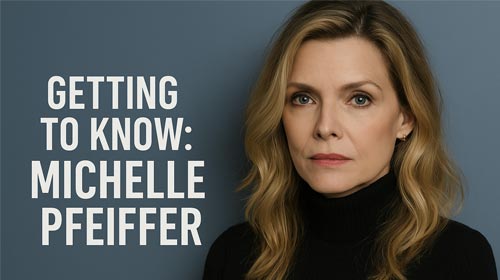It's a simple rule of movie thumb. Whatever the picture, whoever its stars, if Frances McDormand is in the cast, she'll be the best thing in it. For someone of her talent, she hasn't made half as many films as she might have done. But McDormand tends to do things her own way, as the latest entry in Cinema Paradiso's Getting to Know series will reveal.
Before the end of this month, Frances McDormand could have a third Academy Award for Best Actress on her mantelpiece. If she wins, she will surpass the achievement of such two-time winners as Luise Rainer, Bette Davis, Olivia De Havilland, Vivien Leigh, Ingrid Bergman, Elizabeth Taylor, Glenda Jackson, Jane Fonda, Sally Field, Jodie Foster, Meryl Streep and Hilary Swank. Indeed, only Katharine Hepburn would be ahead of her and one of her four wins came in a tie with Barbra Streisand. The only actor to win three times is Daniel Day-Lewis, but McDormand goes about preparing for roles in an entirely different way.
According to the New York Times, McDormand has the ability to suggest that the characters she plays have 'a fascinating inner life just out of the viewer's reach'. Director Cameron Crowe reckons 'she just crackles with life' and such is her presence that she has the knack of placing women on the periphery of the action in the centre of the screen. For that alone, she should be lauded. But McDormand has also coaxed film-makers and audiences alike into rethinking their expectations when it comes to female characters of a certain age.
Frances McDormand: Upbringing
Born Cynthia Ann Smith in Gibson City, Illinois on 23 June 1957, Frances Louise McDormand had her name changed when she was adopted by Canadians Vernon and Noreen McDormand at the age of 18 months. While in her teens, she turned down the chance to meet her biological mother, whom she later described as 'white trash' in joking 'I identify as gender-normative, heterosexual and white-trash American.'
Frances was the last of three children to be adopted by the McDormands, who also fostered another nine and 'took in stray cats'. However, as her father was a Disciples of Christ pastor who specialised in revitalising dwindling congregations, Frances and siblings Dorothy and Kenneth moved around a lot. Following spells in Hillsboro, Kentucky, Statesboro, Georgia and Chattanooga, Tennessee (where their estate had been built over the town dump and encouraged treasure hunting), the family settled in Monessen, Pennsylvania.

It was at Monessen High School that the bookish McDormand acted for the first time, when an English teacher asked her to perform the sleepwalking scene from William Shakespeare's Macbeth. The 14 year-old could scarcely have anticipated that, half a century later, she would team with fellow Oscar winner Denzel Washington in The Tragedy of Macbeth. Filmed during the pandemic, this black-and-white soundstage saga marks a rare solo venture for McDormand's husband, Joel Coen, and will be released through the ever innovative A24 company, whose output has been highlighted in a Cinema Paradiso showcase.
On graduating in 1975, McDormand took a degree in theatre at Bethany College in West Virginia, where she played Desirée in an adaptation of Stephen Sondheim's musical, A Little Night Music. As she later pointed out, 'We would do O'Neill and Ibsen. We weren't just doing razzmatazz, jazz-hands stuff.' But McDormand was the standout and some of her tutors contributed towards her fare so that she could audition for the Yale Drama School. Here she was mentored by Lloyd Richards, who became the first African American to direct on Broadway in 1959, when he teamed Sidney Poitier and Ruby Dee in Lorraine Hansberry's A Raisin in the Sun, which the leads would film for Daniel Petrie in 1961.
Frances McDormand's Early Roles
On earning her Fine Arts degree, McDormand went to New York, where she shared an apartment in the Bronx with future Oscar winner Holly Hunter. Following a trip to Trinidad to make her professional bow in Derek Walcott's In a Fine Castle, McDormand worked in a café and appeared in commercials while trying to establish herself in plays like Painting Churches and Awake and Sing! (both 1984). Her break came, however, when Hunter's scheduling conflict prompted her to recommend her roommate for the role of Abby Marty in Blood Simple (1984), a comic neo-noir that had been written by first-timer siblings Joel and Ethan Coen. They were amused when McDormand rejected a callback because she had promised to watch her boyfriend's bit part in a TV soap opera. They also recognised her suitability for the pivotal role and rearranged the meeting so that McDormand could play the adulterous wife who provokes Texas bar owner Julian (Dan Hedaya) into hiring sleazy shamus Lorren Visser (M. Emmett Walsh) to murder Abby and her lover, Ray (John Getz).
McDormand didn't enjoy acting for the camera, but she got along well with her director, who gave her a box of Dashiell Hammett and Raymond Chandler novels after she had asked him to recommend a book to read during the shoot. Realising that Joel Coen was flirting with her, McDormand insisted on an after-hours meeting to discuss James M. Cain's The Postman Always Rings Twice (which had been filmed by Tay Garnett in 1946 and Bob Rafelson in 1981). The book chat led to the pair moving in together and they remain an item 37 years later. Despite positive notices for her screen debut, McDormand found worthwhile roles difficult to come by. As she later explained, 'I was too old, too young, too fat, too thin, too tall, too short, too blond, too dark,' However, she reasoned 'at some point they're going to need the other. So I'd get really good at being the other.' She refined this otherness as a nun in Sam Raimi's Crimewave (1985), which had been co-scripted by the Coens, and as Dot, the know-all neighbour who offers Hi (Nicolas Cage) and Edwina (Holly Hunter) child-rearing tips in the Coen crime screwball, Raising Arizona (1987). Moreover, she ventured into television and followed six episodes as Public Defender Connie Chapman in Season Five of Hill Street Blues (1981-87) by guesting in Spenser For Hire and The Twilight Zone (both 1985-88).

The theatre also continued to beckon and it was McDormand's Tony-nominated performance as Stella Kowalski in a revival of Tennesse Williams's A Streetcar Named Desire (a role that had earned Kim Hunter a Best Supporting Oscar in Elia Kazan's 1951 filming) that persuaded Alan Parker to cast her as Mrs Pell, the owner of a Jessup County beauty parlour who becomes involved with FBI agent Rupert Anderson (Gene Hackman) while he is investigating the activities of her Klansman husband, Deputy Sheriff Clinton Pell (Brad Dourif) in Mississippi Burning (1988).
Although nominated for Best Supporting Actress, McDormand would lose out to Gena Davis in Lawrence Kasdan's adaptation of Anne Tyler's The Accidental Tourist. But what proved even more frustrating was that the acclaim failed to translate into offers of work, besides a teaming with Gary Oldman and Dennis Hopper in Mick Jackson's little-seen Chattahoochee (1988). Even the Coens opted for Marcia Gay Harden for the role of Verna Bernbaum in Miller's Crossing (1990) and McDormand had to settle for an uncredited bit as the mayor's secretary.
Determined to remain an actor rather than become a star, McDormand decides to reunite with Sam Raimi to play the vigilante anti-hero's lawyer girlfriend in Darkman. Unfortunately, she found the experience dispiriting in the extreme and later confessed, 'I was really bored out of my mind just being a kind of prop, and a woman in an action film is a prop.' However, the assignment led to her accepting Ken Loach's offer to play Ingrid Jessner, the assistant to civil rights lawyer Paul Sullivan (Brad Dourif), in Hidden Agenda (both 1990) after Northern Irish co-star Liam Neeson had urged her not to pass up the opportunity to work with a director whom she admits to having known nothing about when he contacted her.

At the end of the shoot, Loach confided to McDormand, 'Not only have you changed my opinion of actors, you've changed my opinion of Americans.' Yet. despite hooking up with Holly Hunter on Martha Coolidge's teleplay, Crazy in Love (1992), McDormand found herself stuck in a rut of playing supporting roles like lesbian dress shop clerk Grace in Terry Hughes's The Butcher's Wife (1991), nun Nora Scanlan in Charlie Peters's Passed Away (1992) and a woman on TV in Gregory Hines's Bleeding Hearts (1994). Not even the Coens could come up with anything better for her, as she voiced a stage actress in Barton Fink (1991) and played another secretary in The Hudsucker Proxy (1994).
The brightest spot was the chance to essay the two-timing Betty Weathers in Robert Altman's Raymond Carver dramedy, Short Cuts (1993), which McDormand earned a share of the Volpi Cup for Best Ensemble Cast at the Venice Film Festival. John Dorr and Mike Kaplan told the story of the shoot in their documentary, Luck, Trust and Ketchup (1993), while is available from Cinema Paradiso, as is an Instant Expert's Guide to Altman's remarkable life and career.
Coming or Coen, Near or Fargo
Having played Patricia Arquette's sister in John Boorman's political drama, Beyond Rangoon, McDormand took another role 'to prove that I could be funny' when she cameo'd as an alcoholic hooker named June in Alan Taylor's heist caper, Palookaville (both 1995). In fairness, she had other things on her mind, as she and Joel Coen had arranged to adopt a six-month Paraguayan boy named Pedro. Perhaps that's why Brainerd police chief Marge Gunderson is pregnant in Fargo (1996), a wonderfully offbeat crime comedy that was set in the Minnesota backwoods in which the Coens had grown up.
Yet McDormand wasn't convinced by the script or the character and later confessed, 'It wasn't obvious to me what her power was.' In truth, much of the plot revolves around crooked car dealer Jerry Lundergard (William H. Macy). But McDormand was so compelling whether doting on husband Norm (John Carroll Lynch) or tracking down would-be kidnappers Carl Showalter (Steve Buscemi) and Gaear Grimsrud (Peter Stormare) that she thoroughly deserved the Academy Award for Best Actress.
Despite winning such a prestigious prize, however, McDormand declined to play the fame game and even refused to allow mention of her success in the programme notes when she jetted off to Dublin to play Blanche DuBois (a part that had earned Vivien Leigh an Oscar) in the Gate Theatre production of A Streetcar Named Desire. She also insisted on remaining a team player in being cast as lesbian Irish expatriate Conlan in Nick Hamm's Talk of Angels; Gus the mechanic in Martin Bell's indictment of American poverty, Hidden in America; psychiatrist Molly Arrington in Gregory Hoblit's courtroom thriller, Primal Fear; a Texan sheriff's football-mad ex-wife Bunny in John Sayles's Lone Star (all 1996); spiky German Jewish doctor Verstak in Bruce Beresford's Japanese internment camp drama, Paradise Road (1997); and a recovering alcoholic named Alice in John Raffo's Johnny Skidmarks (1998).

Showbiz bible Variety suggested that McDormand's star chemistry with crime scene photographer Peter Gallagher in the latter 'should be bottled as a sure fire insomnia cure'. Maybe that's why it and so many other of McDormand's vehicles from this period are not available on disc. Not even the Sesame Street educational video, Big Bird Gets Lost. Fortunately, Cinema Paradiso users are able to see her bonding with young Hatty Jones as Sister Clara Clavell in Madeline (both 1998), Daisy von Scherler Mayer's lively retelling of Ludwig Bemelmans's delightful books about a determined 1950s orphan trying to stop the closure of her Parisian school.
Having played Merope opposite Billy Crudup in Yale classmate Dare Clubb's four-hour off-Broadway take on Sophocles's Oedipus (1998), McDormand returned to the screen with a bang in 2000. She racked up award nominations for her pitch perfect performances as Sarah Gaskell, the Pennsylvania university chancellor having an adulterous affair with blocked novelist Grady Tripp (Michael Douglas), in Curtis Hanson's Wonder Boys and as Elaine Miller, the divorced college professor mother of teenage wannabe rock writer William (Patrick Fugit), in Cameron Crowe's semi-autobiographical rite of road passage, Almost Famous. In addition to landing a string of critic awards for the former, McDormand was also nominated for the Golden Globe and the Academy Award for Best Supporting Actress for the latter. However, she lost out to Marcia Gay Harden for her performance as Lee Krasner in Ed Harris's art biopic, Pollock (2000).
In 2001, McDormand followed narrating duties on Berkeley Breathed's animated short, Edwurd Fudwupper Fibbed Big, by reuniting with the Coens on their 1940s noir, The Man Who Wasn't There (2001). Cast as Doris, the hard-drinking book-keeper whose infidelities provoke barber husband Ed Crane (Billy Bob Thornton) into letting her take the rap for a blackmail scam, McDormand helped her husband to a share of the Best Director prize at Cannes with David Lynch for Mulholland Drive.
She causes further embarrassment, this time to psychiatrist son Sam (Christian Bale), as Jane, the achingly hip, party-loving record producer in Lisa Cholodenko's Laurel Canyon, which gave McDormand a rare crack at a starring role. However, she was back in support mode as Michelle, the girlfriend of New York cop Vincent LaMarca (Robert De Niro). who can't understand why he is so reluctant to help son Joey (James Franco) beat a drug charge in Michael Caton-Jones's City By the Sea (both 2002). Completing the year was a stage stint in Brooklyn as Oenone in To You, the Birdie!, the Wooster Group's avant-garde reinterpretation of Racine's 1677 play, Phèdre.
On returning to the screen in Nancy Myers's Something's Gotta Give (2003), McDormand went more mainstream than usual in playing Zoe Barry, the lesbian feminist women's studies tutor who wholly disapproves of the relationship between her Broadway playwright sister, Erica (Diane Keaton), and Harry Sanborn (Jack Nicholson), a sixtysomething multimedia tycoon with a reputation for dating women half his age. She sprung another surprise by taking the role of The Handler, the leader of the Monican underground movement in the 2045 dystopia of Bregna in Karyn Kusama's Æon Flux (2005), a sci-fi adventure that was spun-off from an MTV series that is also available to rent from Cinema Paradiso.

Charlize Theron, the star of both versions, found herself opposite McDormand again in Niki Caro's North Country (2005), a hard-hitting drama set in the iron mines of Northern Minnesota in the late 1980s, in which flinty truck driver Glory Dodge (McDormand) backs single mother Josey Aimes when she's subjected to sexual harassment in the workplace. Anticipating the issues raised by the #MeToo and Time's Up campaigns, this fact-based picture earned McDormand another Best Supporting Oscar nomination. This time, she was pipped by Rachel Weisz's for Fernando Meirelles's John Le Carré adaptation. The Constant Gardner.
Fresh from voicing principal Melanie Upfoot in the 'Girls Just Want to Have Sums' episode of Season 17 of The Simpsons, McDormand scooped the Best Supporting Female prize at the Independent Spirit Awards for her crotchety turn as Jane, the fashion designer whose life takes a downturn after she, TV writer Christine (Catherine Keener) and home-maker Franny (Joan Cusack) compare their comfortable lives with that of hard-up cleaner Olivia (Jennifer Aniston) in Nicole Holofcener's acerbic Los Angeles comedy, Friends With Money (2006).
The Awards/Rewards of McDormand

Following a brief hiatus, McDormand returned to the screen as Guinevere Pettigrew, the dowdy governess in prewar London who discovers the good life when she's hired by nightclub singer Delysia Lafosse (Amy Adams) in Bharat Nalluri's lively adaptation of Winifred Watson's 1938 novel, Miss Pettigrew Lives For a Day. Yet it wasn't this comic masterclass that earned McDormand a Golden Globe nomination, but Joel and Ethan Coen's Burn After Reading (both 2008), in which she and Brad Pitt are cast as Linda Litzke and Chad Feldheimer, co-workers at the Hardbodies gymnasium, who try to make a quick buck after mistaking the memoirs left in the locker room by ex-CIA analyst Osbourne Cox (John Malkovich) for hot government secrets. The in-family joke in the screenplay is Linda's desire to have cosmetic surgery, as McDormand has no time for such vanity and doesn't even wear make-up away from the film set.
She reunited with Malkovich to make a rare excursion into the realm of blockbusters to play Director of National Intelligence Charlotte Mearing in Michael Bay's Transformers: Dark of the Moon (2011), which made for a dramatic contrast with David Lindsay-Abaire's Broadway play, Good People , which earned McDormand a Tony Award for her performance as Margie Walsh, a single mom from a rundown neighbourhood in Boston, who attends an old school friend's party in the hope of landing a much-needed new job.
McDormand has always taken pride in playing blue-collar characters: 'Those are the people that held me and raised me, and the work ethic I have.' Consequently, she jumped at the chance to play Jane, the firefighter wife of retired rock star Cheyenne (Sean Penn) in Paolo Sorrentino's quirky Holocaust road movie, This Must Be the Place (2011), which follows the Goth icon from his Dublin home on a search for the Auschwitz guard who had tormented his recently deceased father. But McDormand also likes testing herself by working with new directors and, thus, she signed up to play attorney Laura Bishop in Wes Anderson's Moonrise Kingdom, a coming-of-age comedy in which 12 year-old Suzy Bishop (Kara Hayward) has a major impact on orphaned pen pal Sam Shakusky (Jared Gilman) at a New England summer camp.

Having sidelined into villainous voiceover territory to croon 'Non, je ne regrette rien' as Captain Chantal Dubois, the Animal Control leader determined to add Alex the lion (Ben Stiller) to her collection of stuffed trophies in Eric Darnell, Conrad Vernon and Tom McGrath's animation, Madagascar 3: Europe's Most Wanted, McDormand found another way to espouse an ecological message as Sue Thomason, the partner of Steve Butler (Matt Damon), who arrives in a small, economically depressed Pennsylvania town intent on persuading the locals to sell him gas drilling rights in Gus Van Sant's Promised Land (both 2012).
Intent on finding projects that reflect women's concerns, McDormand turned producer on Amy Berg's Every Secret Thing. But, while she remained off camera in this drama, she took the title role in the HBO mini-series, Olive Kittridge (both 2014), which was based on the Elizabeth Strout tome that McDormand had managed to option a week before it won the Pulitzer Prize. 'I became interested in educating people in the variety of ways in which women can express their emotion,' McDormand explained. 'Which is much easier to do in a large role than in a supporting role to a male protagonist. In general, the women in a supporting role to a male protagonist - cry a lot.' She continued, 'My politics are private, but many of my feminist politics cross over into my professional life. Because I portray female characters, so I have the opportunity to change the way people look at them.'
Directed by Lisa Cholodenko, the four-part saga centres on a retired schoolteacher in the small town of Crosby, Maine and won eight Emmys, including Best Actress. This meant that McDormand (who also won the Screen Actors Guild Award) became part of the exclusive Triple Crown club of those who have won the Oscar, Tony and Emmy for Best Actress. Fellow members Helen Hayes, Ingrid Bergman, Shirley Booth, Jessica Tandy, Anne Bancroft, Maggie Smith, Helen Mirren, Jessica Lange and Glenda Jackson are often listed alongside Rita Moreno, Maureen Stapleton, Vanessa Redgrave, Ellen Burstyn and Viola Davis, whose hat-trick includes an accolade for a supporting role.
Despite an announcement that McDormand would reunite with Kittridge screenwriter Jane Anderson on an adaptation of novelist Conrad Richter's The Awakening Land trilogy, the project remains unrealised. She has been busy, though, as she followed up a gig voicing Momma in Peter Sohn's Disney animation, The Good Dinosaur (2015), with a one-scene cameo in Joel and Ethan Coen's Hail, Caesar! (2016), as chain-smoking editor C.C. Calhoun, who was based on Margaret Booth, the long-standing supervising editor at MGM, who received an Oscar nomination for Frank Lloyd's Mutiny on the Bounty (1935).
More significantly, McDormand won her second Academy Award for Best Actress for her uncompromising performance as Mildred Hayes in Martin McDonagh's Three Billboards Outside Ebbing, Missouri (2017). Initially, she didn't think she was suited to playing a mother berating the local police department for its failure to investigate the rape and murder of her teenage daughter. 'When I first read it, I loved it, I thought Mildred was amazing,' the 58 year-old explained. 'I was very flattered, but then I said, "No, I'm sorry, I'm too old."' But Joel Coen talked her into taking the role and she revealed 'I completely based the character upon John Wayne and John Ford movies, because that's a two-hour arc. Those characters can come out of nowhere, they don't need a lot of background, you don't have to explain why they're like that, they just are the way they are'.
In addition to the Oscar, McDormand also won the Golden Globe and the Screen Actors Guild awardsand she used her acceptance speeches to publicise the #MeToo and Time's Up movements and draw attention to the fact 'there are always roles waiting in the theatre for actresses - huge chunks of bloody red meat to get a hold of, whereas in film there's mostly just cocktail peanuts'. As if to prove her point, McDormand has been heard, but not seen in her most recent assignments, as the voices of Interpreter Nelson in Wes Anderson's offbeat stop-motion animation, Isle of Dogs (2018), and of God in Neil Gaiman and Terry Pratchett's TV series, Good Omens (2019), which stars Michael Sheen as the prissy angel Aziraphale and David Tennant as the fast-living devil, Crowley.

But McDormand has been anything but idle. Indeed, she has been doubling up as actor-producer on Chloé Zhao's Nomadland (2020), which was based on Jessica Bruder's 2017 non-fiction tome, Nomadland: Surviving America in the Twenty-First Century. By all accounts, McDormand had told her spouse at some time in her forties, 'When I’m 65, I'm changing my name to Fern, I'm smoking Lucky Strikes, drinking Wild Turkey, I'm getting an RV, and hitting the road.'
Fran actually fulfilled her ambition a little ahead of schedule, but Fern is surrounded by autobiographical details. But this has also been something of a method assignment as Zhao (who was hired on the strength of her work on The Rider, 2017) made McDormand work at the various jobs Fern undertakes during the course of her travels. Come Oscar night, she faces stiff competition from Viola Davis (Ma Rainey's Black Bottom), Carey Mulligan (Promising Young Woman), Andra Day (The United States vs Billie Holiday) and Vanessa Kirby (Pieces of a Woman). But, whether she makes history of not, McDormand will continue to take ensemble roles like that of Lucinda Krementz, a journalist based in the fictitious town of Ennui-sur-Blasé, in Wes Anderson's forthcoming comedy, The French Dispatch of the Liberty, Kansas Evening Sun (2021). You betcha!






























































